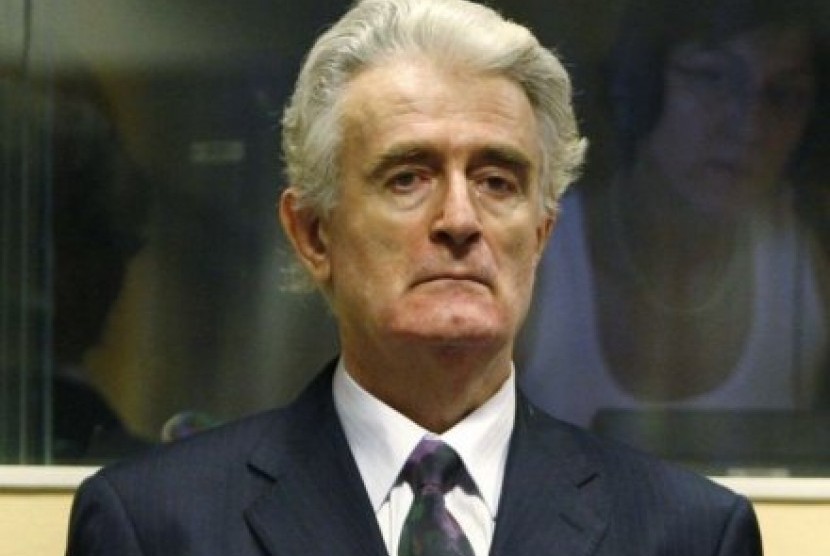REPUBLIKA.CO.ID, THE HAGUE -- UN judges on Thursday began reading their verdict in the genocide trial of former Bosnian Serb leader Radovan Karadzic over the 1995 Srebrenica massacre, Europe's worst atrocity since World War Two.
Karadzic is the highest-ranking person to face a reckoning before the UN tribunal in The Hague over a war two decades ago in which 100,000 people were killed as rival armies carved Bosnia up along ethnic lines that largely survive today.
Among the main charges is that Karadzic, who was arrested in 2008 after 11 years on the run, controlled Serb forces that massacred 8,000 Muslim men and boys in Srebrenica in 1995 after overrunning the supposed UN-designated "safe area".
Karadzic, who once headed the self-styled Bosnian Serb Republic and was Supreme Commander of its armed forces, said in an interview ahead of the verdict that he had worked to uphold peace and deserved praise, not punishment.
"My permanent fight to preserve the peace, prevent the war and decrease the sufferings of everyone regardless of religion were an exemplary effort deserving respect rather than persecution," he told news portal Balkan Insight.
The 70-year-old former psychiatrist, still in robust health, is charged with two counts of genocide, one for Srebrenica and another for a campaign to purge Bosnian Muslims and Croats from towns around the country.
He could receive a life sentence for these and nine other counts of war crimes and crimes against humanity. Appeals, which could take several more years, are expected regardless of the verdict.
Serbian Prime Minister Aleksandar Vucic said he would stand by the Serbs of Bosnia.
"We will stand by our people and we will protect their existence and their right to have their own state," he said.
Survivors await verdict
The only more senior official to face justice before the International Criminal Tribunal for the former Yugoslavia (ICTY) was the late Serbian President Slobodan Milosevic, who died in custody a decade ago before a verdict was reached.
Ratko Mladic, the general who commanded Bosnian Serb forces, was the last suspect to be detained over the Srebrenica slaughter and is also in a UN cell awaiting judgment.
"Justice is slow but it's coming, so we hope that this time the court will have enough courage to say what really happened, because they only need courage. Facts they already have," said Sakib Ahmetovic, a Bosnian Muslim survivor of the war.
Munira Subasic, whose son was among the victims of Srebrenica, said the "verdict is very important to show new generations, especially those in Serbia who have been poisoned with hatred already, what really happened in Bosnia".
The Srebrenica massacre and the years-long Serb siege of Bosnia's capital Sarajevo, with which Karadzic is also charged, were events that turned world opinion against the Serbs and prompted NATO air strikes that helped bring the war to an end.
Karadzic defended himself through his 497-day trial and called 248 witnesses, poring over many of the millions of pages of evidence with the help of a court-appointed legal adviser.
Prosecutors say he conspired to purge Bosnia of its non-Serb population.
Rejecting the charges, Karadzic sought to portray himself as the Serbs' champion, blaming some of the sieges and shelling on Bosnian Muslims themselves. He says soldiers and civilians who committed crimes during the war acted individually.
Judgments remain divisive
Opponents of the ICTY say its prosecutors have disproportionately targeted Serbs as 94 of 161 suspects charged were from the Serbian side, while 29 were Croat and nine Bosnian Muslim.
Prosecutors have been criticised for not bringing charges against two other leaders of that era who have since died - Croatian President Franjo Tudjman and Bosnian President Alija Izetbegovic.
"If you had got prosecutions of those three (including Milosevic) then you'd get a really good picture of the way the violence was produced but we're not getting it," said Eric Gordy, an expert on the court at University College London.
The ICTY, set up in 1991 at the outset of federal Yugoslavia's violent break-up was meant to deter future war crimes and promote reconciliation but its judgments remain divisive.
Many Serbs, both in Bosnia and Serbia, regard the court as a pro-Western instrument, say Karadzic is innocent and believe his conviction would be an injustice for all Serbs.
Their belief is strengthened by the fact that the sentencing coincides with the anniversary of the 1999 NATO bombing of Serbia that led to independence for the ethnic Albania-dominated province of Kosovo.
Serge Brammertz, prosecutor at the tribunal, worries that its work, which is winding down, has done little to heal the war's deep wounds.
"I'm not convinced everyone has really understood the wrongdoings from the past," he said. "Many people in all the former Yugoslavia are still using a rhetoric that is still closer to what we heard in court than we should expect."


